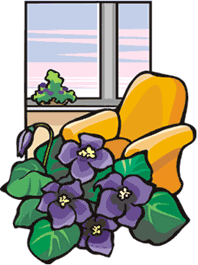
How to clean an African violet
And other fuzzy indoor plants
By Marion Owen, Fearless Weeder
for PlanTea, Inc. and
Co-author of Chicken Soup for the Gardener's Soul
FEATURE ARTICLE:

Tom Hanks' "Power of Four" solution
More good stuff:
Who is Marion Owen?
FAQs about PlanTea
Search Marion's articles, tips and recipes
Why grow organic?
News and press releases
Read love letters
How to link to this site
Need a speaker?
How to contact Marion
Visiting Alaska?
Come to Kodiak Island!
Go to home page

Marion's UpBeet Gardener
Newsletter has been
replaced by Marion's blog
which you can find at:
www.marionowen.wordpress.com
 It's a good idea to occasionally wash the leaves of houseplants so they can absorb more sunlight and literally, breathe easier. Wiping them off with a damp rag or giving them a quick shower does the trick. But what if giant 'dust bunnies' have settled on your African violets?
It's a good idea to occasionally wash the leaves of houseplants so they can absorb more sunlight and literally, breathe easier. Wiping them off with a damp rag or giving them a quick shower does the trick. But what if giant 'dust bunnies' have settled on your African violets?
African violets (one of the most popular indoor plants) and other hairy-leaf plants, like cyclamens and begonias really don't care for showers. The answer, is to get artistic. Use a small, stiff paintbrush to sweep the surface dust from individual leaves. You can also clean their leaves with a soft rag dipped in mild, soapy water.

To keep the leaf from snapping off, slip your hand underneath it, supporting it lightly, then softly brush from the base of the leaf to its tip. And then when you’re done cleaning, celebrate with a fresh family of foliage plants. Palms, philodendrons, peace lilies and snake plants are four of the best easy-to-grow and easy-to-clean houseplants.
For a great source for houseplants (wonderful selection), visit Glasshouse Works at Glasshouseworks.com. And how about an excellent book about h ouseplant care? My friend Larry Hodgson wrote Houseplants for Dummies. You can find used copies on Amazon.com (see link on the navigation bar, at the left side of this page.) And for a kelp-based, organic fertilizer that's ideal for African violets and other indoor plants, consider PlanTea, the organic fertilizer in handy tea bags. You plants will love you!
ouseplant care? My friend Larry Hodgson wrote Houseplants for Dummies. You can find used copies on Amazon.com (see link on the navigation bar, at the left side of this page.) And for a kelp-based, organic fertilizer that's ideal for African violets and other indoor plants, consider PlanTea, the organic fertilizer in handy tea bags. You plants will love you!
In their daily routine, plants inhale carbon dioxide and exhale oxygen, just the opposite of what we do to stay alive. Nice tradeout, wouldn't you say? Along with adding some greenery to the home, this explains why having houseplants around is very beneficial to our health. Thus, keeping your plants healthy, helps you, too!
Speaking of houseplants, one reader asked: Can I put my dirty, old kitchen sponge into the compost pile?
Yes, but that sponge is more valuable in your potting soil. Cut up used sponges into chunks and mix them into the soil of your potted plants. The sponge pieces will hold and store water, to buy you a bit more time when you go on vacation or forget to water.
 For more houseplant care tips, visit my collection of articles. I'm sure you'll bump into some helpful tips!
For more houseplant care tips, visit my collection of articles. I'm sure you'll bump into some helpful tips!
Meanwhile, keep in touch, through gardening. Plants don't care if you're having a bad hair day!
Cheers and love to you,
-- Marion Owen
P.S. There are African Violet Associations all around the world. For example, the African Violet Society of America or the African Violet Society of Canada.
![]()
Thanks for visiting and please stop by again. I'll put the coffee on!
Meet Marion Owen /// Learn about PlanTea /// Online Catalog /// Articles, Tips, Recipes /// Get free UpBeet Gardener newsletter /// Read current issue /// Listen to radio show /// Read news and press releases /// More resources and links /// Learn why 'grow organic?' /// View guidelines for retailers /// Read love letters /// Book Marion as a speaker /// Site map /// How to link to us /// Contact us /// Go to home page
PlanTea: The organic plant food in tea bags. http://www.plantea.com
Copyright ©1996 to present: PlanTea, Inc. All Rights Reserved. PO Box 1980, Kodiak, AK 99615-1980 USA
Questions or comments? marion@plantea.com Phone: Toll Free: 1-800-253-6331 (US and Canada); 907-486-2500